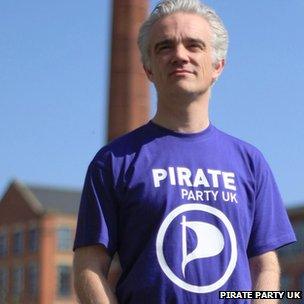Pirate Bay proxy gets shut down after music industry legal threat
- Published

The Pirate Bay website is now banned in a handful of European countries.
A proxy service allowing access to banned piracy website The Pirate Bay has been shut down after legal threats from the music industry.
Minor political group the Pirate Party UK launched the proxy earlier this year ahead of a High Court order blocking The Pirate Bay site.
The British Phonographic Industry (BPI) threatened legal action if the proxy was not removed.
The group has now said such proceedings should no longer be necessary.
The High Court's ruling in April this year meant The Pirate Bay - which was formerly one of the UK's most visited websites - had to be blocked by all the country's major internet service providers.
However, the Pirate Party UK - which is not affiliated with the Pirate Bay - launched a special section of its website which allowed UK users to circumvent the ban and still get onto the site and download movies, music and other pirated material.
'Undermining growth'
After launching the proxy, the Pirate Party website's popularity skyrocketed. According to monitoring service Alexa, prior to the proxy's launch the site was ranked 1,943 in the UK.
It then jumped to 147 - higher than the likes of Netflix, the Huffington Post and the NHS.
At the beginning of December, the BPI wrote to Pirate Party UK leader Loz Kaye to request the proxy be shut down.
Mr Kaye refused, prompting the music industry body to instruct its solicitors to contact the party's executive members individually to warn of possible legal action.
"We asked Pirate Party UK to remove the proxy because The Pirate Bay is an illegal site that is undermining the growth of legal digital music services," said BPI chief executive Geoff Taylor in a statement on Wednesday.
"We believe its executives should respect the law, and the basic right of creative people to be paid for their work.
"There are many fantastic digital music services that make it simple to get music legally online. This outcome will help ensure that this new digital sector in the UK can grow, continue to innovate for music fans, and create more UK jobs."
'Fantastic year'
On Friday, the Pirate Party said it would comply with the BPI's request.

Loz Kaye said he intended to respond to the BPI's request by 6 December
"Despite attempts by elected members to resolve this situation, the law at present is clear and makes any decision to continue hosting the proxy untenable," said the party's lawyer, Frances Nash.
"This is not the outcome the party wanted; however, any challenge to this proposed action would make it financially impossible for the party to deal with other issues for which they actively campaign on a daily basis.
"The Pirate Party strongly believe that site blocking is both disproportionate and ineffective and will continue to lobby for digital rights and their wider manifesto."
Speaking to the BBC, Pirate Party UK leader Mr Kaye said taking on the BPI in court would have been "financially impossible", but said he was happy with his party's stance up to this point.
"No political action is wasted," he told the BBC.
"I look forward to carrying on the political work in 2013. This year has been a fantastic year for our brand of politics. It's clear that it's becoming politically poisonous to be anti-internet."
- Published10 December 2012
- Published5 December 2012
- Published29 November 2012